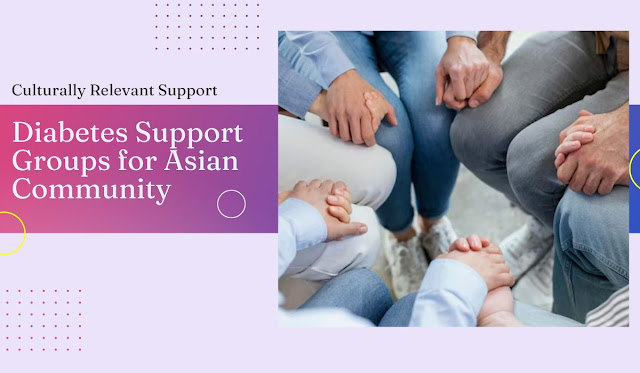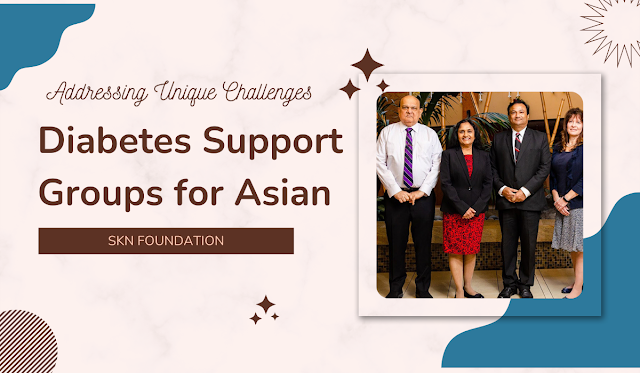Culturally Relevant Support: Diabetes Support Groups for Asian Community
Introduction
Diabetes is a global health challenge, affecting millions of lives across diverse communities. Among those impacted, the Asian community faces unique cultural and dietary factors that influence the prevalence and management of diabetes. In response to these challenges, culturally relevant diabetes support groups have emerged to provide tailored guidance, foster understanding, and promote healthier lifestyles within the Asian community. In this blog post, we will explore the significance of these support groups and how they empower individuals to take control of their health while embracing their cultural heritage.
The Asian Diabetes Challenge
The Asian community is not monolithic; it is incredibly diverse, comprising people from various countries, languages, and traditions. However, there are common factors that contribute to a higher risk of diabetes within this community. Genetics, dietary habits, and cultural beliefs all play a role. For instance, white rice, a staple in many Asian diets, has been linked to an increased risk of type 2 diabetes. Additionally, cultural values around food and family can make dietary changes more challenging. Therefore, addressing diabetes within the Asian community requires a nuanced and culturally sensitive approach.
Cultural Sensitivity: A Foundation for Support
Culturally relevant diabetes support groups understand that culture is not a barrier to health but rather a powerful tool for promoting well-being. They are rooted in cultural sensitivity, acknowledging that individuals have unique cultural beliefs and practices that influence their approach to diabetes management. This approach fosters trust and open communication, ensuring that individuals feel respected and understood in their journey.
Tailored Nutrition Guidance
One of the fundamental aspects of diabetes management is nutrition. Culturally relevant support groups recognize the importance of addressing dietary habits within the Asian community. They provide guidance on how to adapt traditional dishes to be diabetes-friendly, emphasizing portion control and balanced eating. By preserving the flavors and traditions of Asian cuisine while making it healthier, these support groups empower individuals to make sustainable dietary changes.
Language Accessibility
Effective communication is key in any healthcare setting, and language barriers can be a significant obstacle for many Asian individuals. Culturally relevant support groups often provide resources and services in multiple languages, ensuring that information is accessible to all. This approach empowers individuals to ask questions, seek clarification, and actively engage in their diabetes management.
Community and Connection
Diabetes support groups are more than just educational platforms; they are also a source of community and connection. Culturally relevant groups provide a safe space where individuals can share their experiences, challenges, and successes with others who understand their cultural context. These connections foster a sense of camaraderie and reduce the isolation that can come with managing a chronic condition.
Education and Empowerment
Knowledge is a powerful tool in diabetes management. Culturally relevant support groups offer educational workshops, seminars, and informational sessions that address the unique challenges faced by the Asian community. These sessions cover topics such as blood sugar management, medication adherence, and the importance of regular check-ups. By equipping individuals with culturally tailored information, these groups empower them to make informed decisions about their health.
Breaking Stigma and Dispelling Myths
Culturally relevant support groups play a crucial role in breaking the stigma surrounding diabetes within the Asian community. They address cultural beliefs and misconceptions that may contribute to the stigma and prevent individuals from seeking help. By providing a platform for open discussion and education, these groups challenge stereotypes and encourage early diagnosis and treatment.
Family Involvement
Family plays a central role in Asian cultures, and involving family members in diabetes management is often essential. Culturally relevant support groups offer family education sessions to help relatives understand the challenges of diabetes and provide meaningful support. By including family in discussions about meal planning, exercise routines, and emotional well-being, these groups strengthen the support network, making diabetes management a collective effort.
Preserving Cultural Traditions
Cultural traditions are an integral part of Asian identity, and individuals should not have to sacrifice their heritage to manage diabetes. Culturally relevant support groups emphasize preserving cultural traditions while making necessary adaptations for health. This approach allows individuals to continue celebrating cultural festivals, enjoying traditional dishes, and participating in cultural practices without compromising their well-being.
Celebrating Successes
Celebration is an essential part of any journey, and diabetes management is no exception. Culturally relevant support groups celebrate the successes and milestones of their members. Whether it's achieving better blood sugar control, losing weight, or simply feeling more confident in diabetes self-management, these groups provide encouragement and recognition for every step forward.
Conclusion
Culturally relevant diabetes support groups for Asian community are lifelines for individuals and families facing the challenges of diabetes. They bridge cultural gaps, provide tailored guidance, and create a sense of belonging and understanding. By embracing cultural sensitivity, education, and empowerment, these groups empower individuals to take control of their health while celebrating their cultural heritage. In doing so, they not only improve diabetes management outcomes but also strengthen the bonds of community and promote overall well-being.


.jpg)
Comments